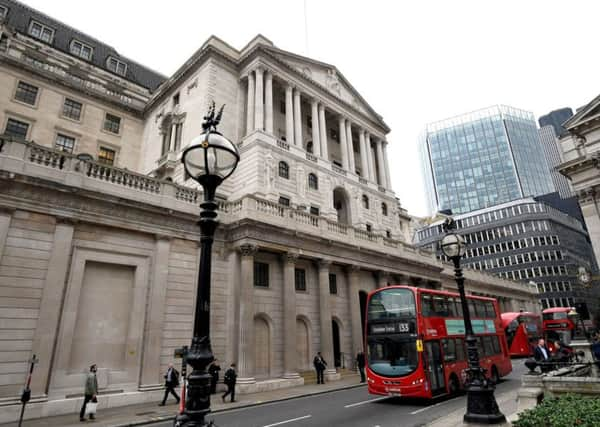Bank of England hikes interest rates to highest level since 2009


Members of the nine-strong Monetary Policy Committee (MPC) voted unanimously yesterday to raise the base rate from 0.5 per cent to 0.75 per cent after the economy bounced back as expected from a snow-hit start to the year.
The move sees rates rise above the emergency low of 0.5 per cent for the first time since March 2009. It marks only the second hike since the global financial crisis and follows the quarter-point increase in November last year.
Advertisement
Hide AdAdvertisement
Hide AdMark Carney, governor of the Bank of England, said rates would need to rise further to bring inflation back to the 2 per cent target over the next few years, but stressed hikes would be “limited” and “gradual”. “Policy needs to walk, not run,” he said.
Alec Pillmoor, personal insolvency partner at RSM, warned yesterday’s 0.25 per cent rise could lead to more people going bankrupt.
He said: “Over the last decade, a whole generation of new borrowers have enjoyed ultra-low rates, but as normality starts to return and rates begin to rise, so will the repayment demands.
“This might only be a quarter percentage point rise, but for those who are already struggling to meet monthly mortgage, loan and credit card repayments, it could be painful.
“Last week, we saw personal insolvency levels rise to a six-year high despite record employment levels and low interest rates. Unless those with problem debts start to get their finances under control, we may well see these numbers rise even further.”
Millions of borrowers on variable rate mortgages will be affected by the latest hike. A quarter-point rise will add around £16 a month or £190 a year to the average mortgage.
But the rise will offer some relief to savers, who have seen their nest eggs decimated by above-target inflation and negligible returns. The bank had backed away from a rate rise earlier this year after growth slowed down sharply to 0.2 per cent in the first quarter, but said the economy had recovered as predicted.
The institution forecast growth rebounding to 0.4 per cent in the second quarter, with data pointing to a similar increase between July and September.
Advertisement
Hide AdAdvertisement
Hide AdMr Carney said: “UK growth in the second quarter is estimated to have rebounded as expected, consistent with the MPC’s judgment that the slowdown in the first quarter reflected the weather, not the economic climate.” In its accompanying quarterly inflation report, the bank kept its forecast for growth this year unchanged at 1.4 per cent, but increased the outlook for 2019 to 1.8 per cent from the 1.7 per cent previously predicted.
The report showed its predictions were based on financial market expectations for rates to rise to 1.1 per cent by mid-2021, which would suggest two more quarter-point rises, with the next not until May 2019. But the bank also said inflation, which is running at 2.4 per cent, was set to rise slightly higher than it had predicted in May’s set of forecasts after recent falls in the value of the pound and higher energy prices.
Mr Carney said Brexit was a cloud on the horizon, but added the bank was “well prepared for whatever path the economy takes, including a wide range of potential Brexit outcomes”.
He said: “The MPC will respond to any persistent change in the outlook to bring inflation sustainably back to the 2 per cent target, while supporting jobs and activity.”
James Smith, an economist at ING, said: “Despite the bank’s optimistic outlook, we think policy-makers will find it tricky to hike rates again before Brexit. We don’t expect another rate rise before May 2019.”
Samuel Tombs, at Pantheon Macroeconomics, said while Brexit was likely to delay another imminent rise, “we expect the economy to regain some momentum next year following a soft Brexit outcome, enabling the MPC to raise bank rate twice in both 2019 and 2020”.
Phil Andrew, chief executive at StepChange Debt Charity, said: “Whilst a rise in interest rates might be right for the wider economy, from a consumer debt perspective many households are walking a precarious budget tightrope as their incomes don’t stretch to cover the basics each month.
“These are the households that a rate rise will affect most.
Advertisement
Hide AdAdvertisement
Hide Ad“Policy-makers mustn’t lose sight of what a rate rise means for real people on a tight budget.” Many mortgage borrowers will not immediately feel the impact of rising rates as they are locked into fixed-rate deals, but experts said further rises could limit the number of households accessing mortgage finance, dampening house price growth.
According to research from Savills, lenders have gradually cut their mortgage rates since 2009 to bring them close to the base rate.
The real estate agency said: “As a result, mortgage debt is now cheaper than it has been at any point in the last 20 years. If lenders translate the base rate rise directly to their mortgage lending rates, that would still only bring them back to 2016 levels.
“However, this is unlikely to be the last time we see the Bank of England raise base rates.”
